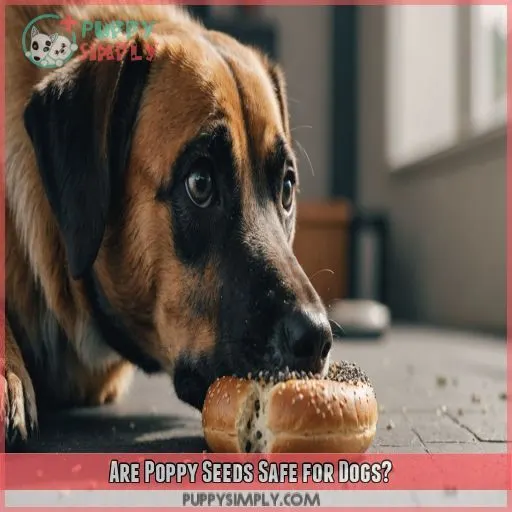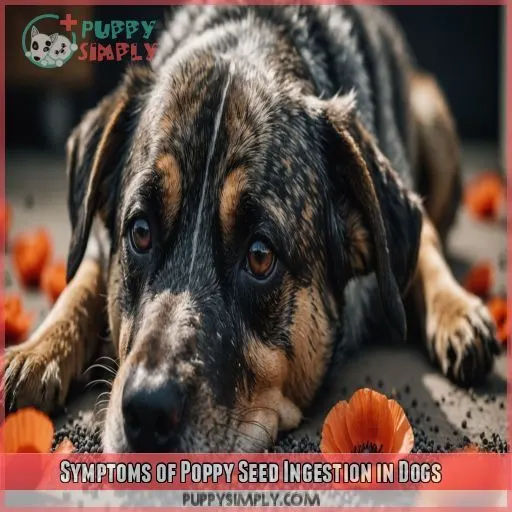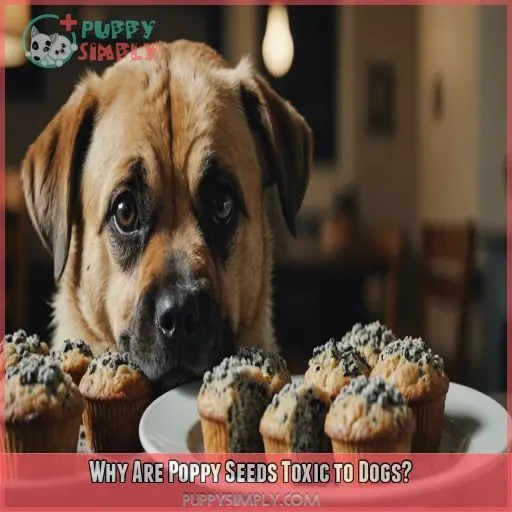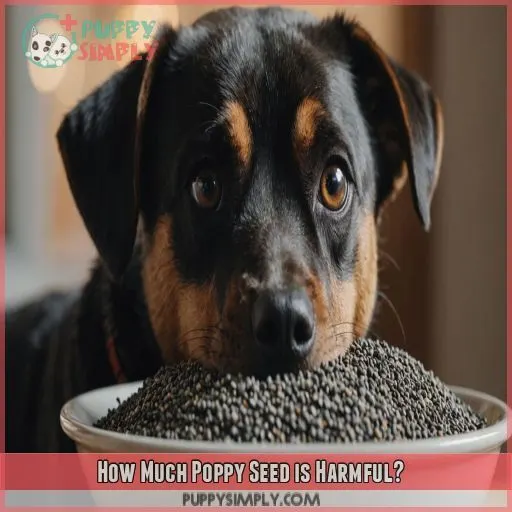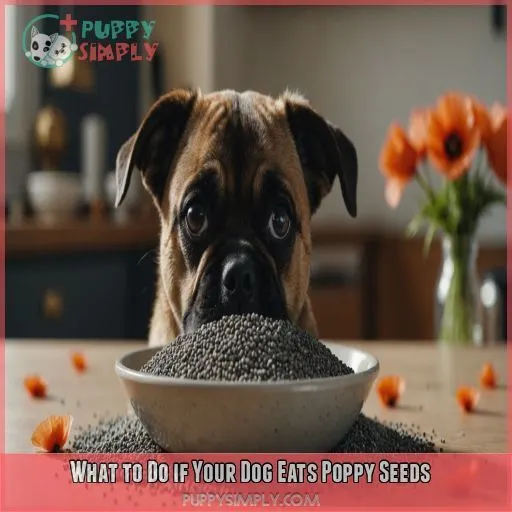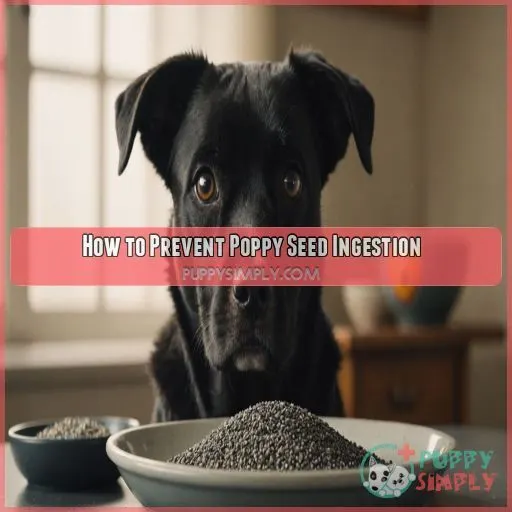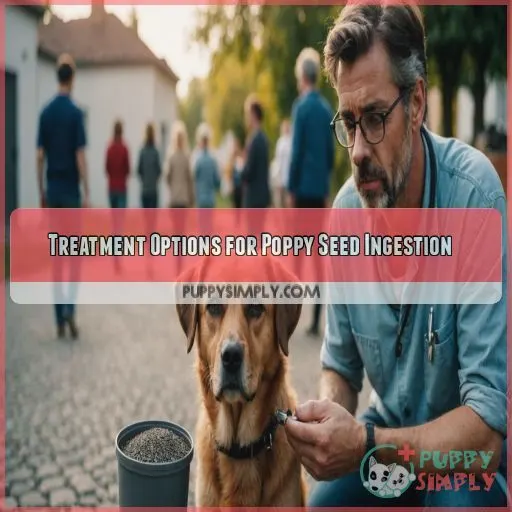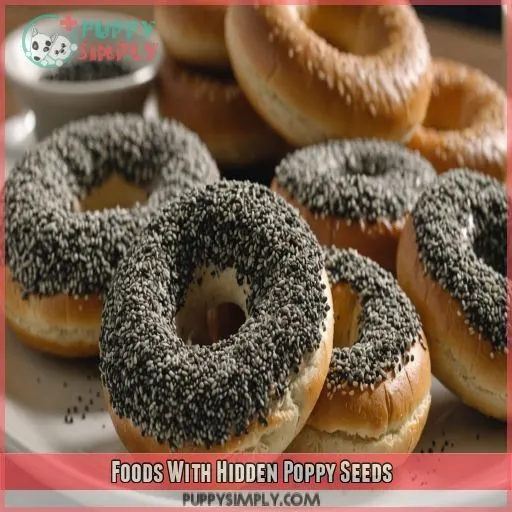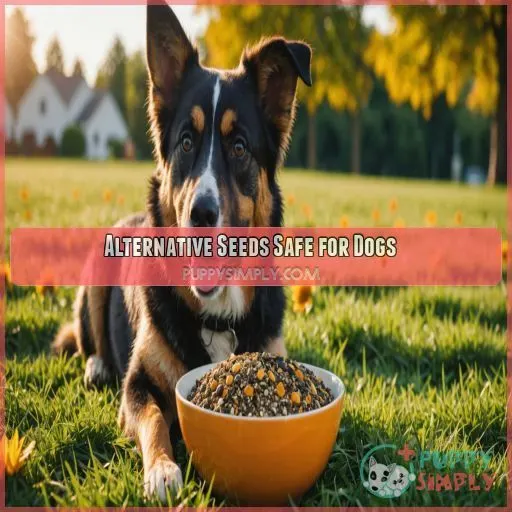This site is supported by our readers. We may earn a commission, at no cost to you, if you purchase through links.
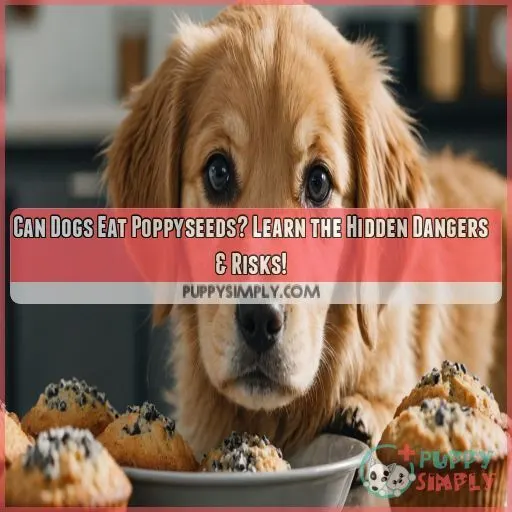 Can dogs eat poppy seeds?
Can dogs eat poppy seeds?
In short, it’s best to keep Fido far away from them.
Poppy seeds might make your bagel tasty, but they can cause serious trouble for your dog.
Due to opiates, even trace amounts may upset a dog’s tummy or mess with their central nervous system.
Symptoms range from mild digestive woes like vomiting and diarrhea to severe lethargy or respiratory problems.
Particularly for smaller pups or those with sensitive systems, it’s a recipe for disaster.
So, stash those baked goods away safely!
Curious about safer snack alternatives for your furry friend?
We have some ideas to share!
Table Of Contents
- Key Takeaways
- Are Poppy Seeds Safe for Dogs?
- Symptoms of Poppy Seed Ingestion in Dogs
- Why Are Poppy Seeds Toxic to Dogs?
- How Much Poppy Seed is Harmful?
- What to Do if Your Dog Eats Poppy Seeds
- How to Prevent Poppy Seed Ingestion
- Treatment Options for Poppy Seed Ingestion
- Foods With Hidden Poppy Seeds
- Alternative Seeds Safe for Dogs
- When to Contact a Veterinarian
- Frequently Asked Questions (FAQs)
- What happens if a dog eats poppy seeds?
- Can dogs eat poppy seed biscuits?
- Can dogs eat bagels with poppy seeds?
- Are poppies poisonous to dogs or cats?
- Can poppy seeds cause long-term health issues in dogs?
- Do poppy seeds affect dogs differently based on size?
- Are there dog breeds more sensitive to poppy seeds?
- Can poppy seeds interfere with dog medications?
- Are there safe alternatives to poppy seeds in dog treats?
- Conclusion
Key Takeaways
- Keep poppy seeds away from your dog; these tiny seeds contain opiates that can upset their tummy and affect their central nervous system. If your pup sneaks a nibble, monitor closely for symptoms like vomiting or lethargy and call your vet if needed.
- Dogs might eat just about anything, but save the poppy seed bagels for yourself. Even a small amount can make your furry friend feel less than great, especially smaller breeds or puppies that are more sensitive.
- You might not spot symptoms right away, but keep an eye out for changes in energy, appetite, or breathing. If your pup’s acting lethargic after a poppy seed treat, it’s time to call the vet.
- Go for safer snack alternatives like pumpkin, chia, or sunflower seeds. These options pack a crunch without the drama, letting your dog’s tail wag with joy instead of worry.
Are Poppy Seeds Safe for Dogs?
You might love sharing snacks with your furry friend, but think twice before offering poppy seeds. While not immediately deadly, these tiny seeds contain opiates, posing hidden risks that could upset your dog’s stomach and leave them feeling less than paw-some.
Toxicity Concerns
Everyone’s got a favorite snack, but regarding poppy seeds, your pup’s curious nibble mightn’t be harmless. While poppy seed poisoning is rare, it’s important to stay cautious:
- Monitor for symptoms
- Consider dog breed sensitivity
- Individual dog reaction varies
- Check poppy seed dosage
- Contact pet poison helpline
Opiates in Poppy Seeds
You’ve learned about the toxicity of poppy seeds; now let’s talk opiates. Poppy seeds contain trace opiate levels, affecting a dog’s central nervous system. Imagine your furry friend with narrowed pupils or loss of coordination. Dog breed sensitivity varies, so human food safety is key. Always keep poppyseeds away.
Potential Risks
While poppy seeds carry opiates, the risk varies. Think about dog size, individual sensitivity, dose response, and pre-existing conditions. A sneaky snack from Fido might seem okay, but even dog treats with poppyseeds could upset the delicate balance of puppy safety, leading to dog health woes or appetite loss. Stay alert!
Symptoms of Poppy Seed Ingestion in Dogs
If your dog has eaten poppy seeds, you might be wondering what signs to look out for. While the amount of opiates in poppy seeds is usually too low to cause serious harm, it’s still important to know the potential symptoms of ingestion.
In this section, we’ll outline the common signs of poppy seed ingestion in dogs, so you can be aware of any changes in your furry friend’s behavior and take appropriate action.
Digestive Upset
Dogs may experience digestive upset after munching on poppyseeds. Imagine the poppyseed as a tiny mischief-maker causing tummy troubles! Signs include:
- Vomiting
- Diarrhea
- Loss of appetite
- Abdominal pain
To soothe your dog’s stomach, try home remedies like a bland diet or probiotics. Got questions? Always ask your vet!
Lethargy and Drowsiness
Uh-oh, if your pup’s acting a bit sluggish after snacking on those poppy seeds, don’t panic! Drowsiness and lethargy are common side effects. Just keep a close eye, and call the vet if the sleepiness lingers or worsens. With some rest, they’ll be back to their bouncy self in no time!
Respiratory Issues
When your pup’s energy drops like a lead balloon and wheezing or coughing join the party, pay attention! Poppyseed-induced asthma and respiratory distress can be the villains.
- Breathing difficulties: Picture a wheezy pug.
- Wheezing or coughing: Sounds alarming, right?
- Immediate attention needed: Don’t let it snowball.
Why Are Poppy Seeds Toxic to Dogs?
You’ve got to hand it to dogs; they’ll eat just about anything, including things they shouldn’t, like poppy seeds. These little seeds contain opiates that dogs are sensitive to, making even a small nibble potentially risky business for your furry friend.
Opiate Content
With poppy seeds, it’s a mixed bag—much like digging into Grandpa’s old candy jar where you may find a surprise. Poppy seeds naturally contain opiates, which can be dangerous for dogs. The opiate levels aren’t sky-high, but considering dogs and opium are as compatible as oil and water, a small amount can still affect them.
| Comparison | Poppy Seeds | Opium |
|---|---|---|
| Substance | Natural Opiates | Processed |
| Opiate Effects | Mild in Humans | Strong |
| Toxicity Level | Low for Humans | High |
| Dog Sensitivity | High | Very High |
Guard against opiate toxicity, providing your dog a safer environment!
Dog Sensitivity to Opiates
Dogs can be surprisingly sensitive to opiates like those found in poppy seeds. You see, their bodies process these compounds differently than ours. Some pups are more susceptible than others, especially smaller breeds, puppies, and those with existing health issues. Keep an eye out for symptoms like lethargy, drowsiness, and digestive troubles. If you spot anything concerning, don’t hesitate to call your vet – they’ll know how to get your furry friend back to their happy, healthy self.
- Opiate sensitivity varies by dog breed
- Puppies and smaller dogs are more at risk
- Pre-existing conditions increase vulnerability
- Watch for signs like lethargy and upset stomach
- Consult your vet if you have any worries
How Much Poppy Seed is Harmful?
You might think your pup’s fascination with your poppy seed muffin is harmless, but even a small amount can stir up some serious tummy trouble. While it’s unlikely that Fido will face a poppy-fueled fiasco, it’s good to know how much could cross the dog’s tolerance threshold.
Amount Needed for Toxicity
Understanding the toxicity threshold for poppy seeds in dogs is key.
You might imagine your dog munching on a poppy seed roll; no harm, right?
Well, it’s not quite that simple.
The poppy seed dosage needed to cause issues varies.
Generally, dogs would need to consume quite a bit before hitting that danger zone.
Larger dogs have a higher tolerance, while small pups or those with sensitive tummies may react unexpectedly.
Factors Affecting Toxicity
Now, what makes poppy seeds more harmful to some dogs than others?
Think about this: a tiny Chihuahua versus a hefty Great Dane.
A dog’s size, combined with its breed, age, and any existing health conditions, plays a big role in how they handle poppy seeds.
Think of it like this: what might barely tickle a Saint Bernard could send a Yorkshire Terrier spinning.
Also, the amount ingested matters too.
If your curious pup sneaks a hefty serving, watch for signs and consult your vet promptly.
What to Do if Your Dog Eats Poppy Seeds
If your dog accidentally gets into your poppy seed rolls, don’t panic! Stay calm and contact your vet right away. They’ll guide you on the best next steps to keep your pup safe and healthy.
Immediate Actions
If your dog digs into a poppy seed roll, don’t panic!
First, quickly remove any remaining food and make sure they have access to fresh water.
It’s like doggy detox time.
Monitor your pup for any signs of tummy trouble like vomiting or diarrhea.
Observe their behavior: are they as peppy as a can of cola, or a bit more chill than usual?
If you notice anything unusual, contact your vet for guidance.
Better safe than sorry, right?
Veterinary Consultation
If your dog starts acting strangely or shows severe symptoms after attempting immediate actions, don’t hesitate to contact emergency care for a veterinary consultation.
These professionals can help you navigate dog health concerns, providing insights on poppy seed dosage and treatment options.
Keeping Fido safe and sound is everyone’s top priority, so don’t delay reaching out if you’re worried.
How to Prevent Poppy Seed Ingestion
Preventing your dog from munching on poppy seeds is easier than convincing them that human food isn’t the tastiest treat on Earth! Store poppy seed-containing foods securely, supervise your pooch during mealtimes, and train them to resist those sneaky snacking urges.
Safe Food Storage
Keep those poppy seed rolls locked up tight, pup parents! Stash them in a high cabinet or airtight container – you don’t want Fido getting into them. A little dog-proofing goes a long way to prevent tummy troubles. Out of sight, out of mind, right?
Supervised Eating
Now that we’ve tucked away those tasty treats in a safe spot, let’s keep an eagle eye on your pup during mealtime. Picture their soulful eyes begging for table scraps. Supervise your furball to make sure they only munch on dog-safe snacks. Kitchen safety’s a big dealit beats poppyseed problems!
Training Against Scavenging
While keeping snacks out of paw’s reach is important, training your furry companion to resist food temptation is equally important. Use a reward system to encourage good behavior, and practice consistent supervision. Teach your dog "leave it" commands and introduce positive reinforcement. Remember, preventing food-guarding habits helps create a safe eating environment.
Treatment Options for Poppy Seed Ingestion
If your dog has managed to sneak a poppy seed treat, don’t panic just yet; instead, keep an eye out for upset tummies or lethargy. With a little care and some probiotics or a quick vet visit, you’ll be helping your furry friend bounce back faster than it can sniff out another snack!
Symptom Management
If your pup’s tummy is upset after snacking on poppy seeds, don’t panic! Start with some gentle home remedies. Try a bland diet, probiotics to restore gut balance, and plenty of hydration. But keep a close eye – if symptoms persist or worsen, it’s time to call the vet.
- Bland diet
- Probiotic support
- Hydration
- Vet advice
Veterinary Treatment
If Buddy’s acting like a sluggish sack of potatoes after gobbling poppy seeds, it’s time to contact your vet! Discuss veterinary care options, medication dosage, and emergency protocols. With proper treatment, the prognosis and recovery success rates are excellent, giving you peace of mind while Buddy chases squirrels again.
Probiotics and Gut Health
If your dog munches on poppy seeds, probiotics can work wonders for their gut health. Make sure Fido gets:
- Probiotic supplements to boost gut bacteria balance.
- Prebiotics for dogs to nourish good bacteria.
- Digestive health benefits from yogurt for dog digestion.
- Live yogurt’s soothing powers—it’s like a spa day for their tummy!
Foods With Hidden Poppy Seeds
You might be surprised to find poppy seeds lurking in some of your favorite snacks, like bagels or muffins, potentially putting your dog at risk. It’s important to keep these goodies out of your pup’s reach to avoid any unintended "poppy-seeded" mishaps!
Common Snack Foods
Poppyseed bagels, muffins, cookies, cakes, and breads may look innocent, but they can be dangerous for your dog.
These tasty treats often contain poppyseeds, which can be harmful to dogs.
While the amount of poppyseeds may seem small, it’s best to keep these snacks out of your dog’s reach.
One curious nibble could lead to an upset stomach or worse.
It’s better to be safe than sorry when it comes to your pup’s health.
Awareness and Prevention
Just when you thought a poppy seed muffin was safe, think again! Those sneaky poppy seeds might be lurking in unexpected places. Here’s how to keep your furry friend safe:
- Safe Food Storage: Keep those poppy seed delights out of paw’s reach.
- Supervised Feeding: Always watch your dog’s meals and treats closely.
- Dog Training: Teach Fido to resist the irresistible.
Alternative Seeds Safe for Dogs
While poppy seeds aren’t safe for dogs due to the risk of toxicity, there are plenty of other seeds they can enjoy. Pumpkin seeds, chia seeds, and sunflower seeds are safer alternatives that can add a bit of crunch and nutrition to your dog’s diet—no poppy-seeded drama involved!
Pumpkin Seeds
Pumpkin seeds are a good choice for dogs because they bring to the table both nutrition and taste. They’re packed with nutrients that benefit your furry friend!
| Benefit | Description |
|---|---|
| Nutrition Boost | Rich in vitamins |
| Easy Storage | Store in airtight jars |
| Allergy Check | Rare dog allergies |
Serve them plain or toasted—your dog will wag its tail in joy!
Chia Seeds
Chia seeds are a great alternative for dogs! These tiny powerhouses are packed with fiber, protein, and omega-3s to support healthy digestion. Just be mindful of portion sizes, as too much can cause tummy troubles. Sprinkle some chia on your pup’s food for a nutritious boost!
Sunflower Seeds
Sunflower seeds, the tiny powerhouses, are a delightful treat for dogs! They pack a nutritional punch without the headache of opiates lurking in poppy seeds. Some dogs might’ve sunflower seed allergies, so start small. Sunflower seed snacks and oil are generally safe, providing fiber and healthy fats. Your furry friend’ll thank you!
When to Contact a Veterinarian
If your dog eats poppy seeds and starts acting like they’re in a food coma or a steamy romance novel, it’s time to give your vet a call poppy seed poisoning symptoms.
. Keep a close eye on your furry friend and contact a professional if their symptoms don’t improve with home care.
Severe Symptoms
If your dog hits a rough patch with severe vomiting, respiratory distress, or alarming lethargy after munching on poppy seeds, it’s no time to play fetch with fate. Seizures or a complete loss of appetite call for immediate action. Give your vet a buzz. Your furry pal’s safety is in the spotlight!
Unresponsive to Home Care
If your pup’s symptoms persist or worsen despite your best home care efforts, it’s time to contact your veterinarian. Don’t hesitate – their expertise is essential when dealing with:
- Severe vomiting or diarrhea
- Lethargy or difficulty breathing
- Lack of appetite or dehydration
- Any other concerning changes in your dog’s condition
Monitoring Dog’s Condition
Keep an eagle eye on your pup if she’s snuck some poppy seeds. Look for dog behavior changes like shifts in energy levels or appetite changes. Bowel movements gone haywire? Breathing difficulties? These red flags mean it’s time to ring your vet. Trust your gut; your furry friend needs you!
Frequently Asked Questions (FAQs)
What happens if a dog eats poppy seeds?
If your pup gets into the poppy seeds, don’t panic! They may experience some mild tummy troubles, but as long as they don’t gobble down a ton, they’ll likely be just fine. Just keep an eye on them and call the vet if you’re worried.
Can dogs eat poppy seed biscuits?
Think of poppy seeds as tiny fireworks for dogs’ tummies best avoided. While nibbling on a poppy seed biscuit mightn’t cause chaos, its safer to keep these out of paws’ reach. Your pup’s health will thank you!
Can dogs eat bagels with poppy seeds?
While poppy seed bagels might be a treat for humans, they’re not ideal for dogs. Poppy seeds contain opiates that could upset your dog’s stomach. If your dog nabs one, monitor for any symptoms and consult your vet.
Are poppies poisonous to dogs or cats?
Poppies are like that friend who’s a bit too much fun at parties—dogs and cats can suffer from poppy seed toxicity. They might experience lethargy or tummy troubles, so keep these blooms out of paw’s reach!
Can poppy seeds cause long-term health issues in dogs?
Do poppy seeds affect dogs differently based on size?
Yes, poppy seeds can affect dogs differently based on their size. Larger dogs might handle small amounts better than tiny pups. But remember, in regard to poppy seeds, its best to play it safe and avoid them.
Are there dog breeds more sensitive to poppy seeds?
Think of poppy seeds as a tiny Trojan horse. While no specific dog breeds are more sensitive to poppy seeds, individual dogs can differ in sensitivity. If Fido seems affected, chat with your vet for peace of mind.
Can poppy seeds interfere with dog medications?
Poppy seeds might mess with your dog’s medication, acting like an uninvited guest at a party. If your dog gobbles poppy seeds, dial up your vet. They’ll help make sure those sneaky seeds don’t crash the med mix!
Are there safe alternatives to poppy seeds in dog treats?
Are you looking for safer alternatives to poppy seeds in your pup’s treats? Why not try carob chips, crushed nuts, or even a sprinkle of cinnamon – these dog-friendly options can satisfy their cravings without the risks. Your furry friend’s health is top priority!
Conclusion
Imagine this: your dog turns blue trying to sing the poppy seed blues! While it might seem absurdly cute, it’s no joke—poppy seeds can spell trouble for Fido.
So, can dogs eat poppy seeds? Simply put, no! These tiny seeds can upset your dog’s tummy and mess up their mood.
Keep your pet away from poppy seed treats, store them safely, and offer great alternatives like pumpkin or sunflower seeds instead. Your pup’s health is worth it!

